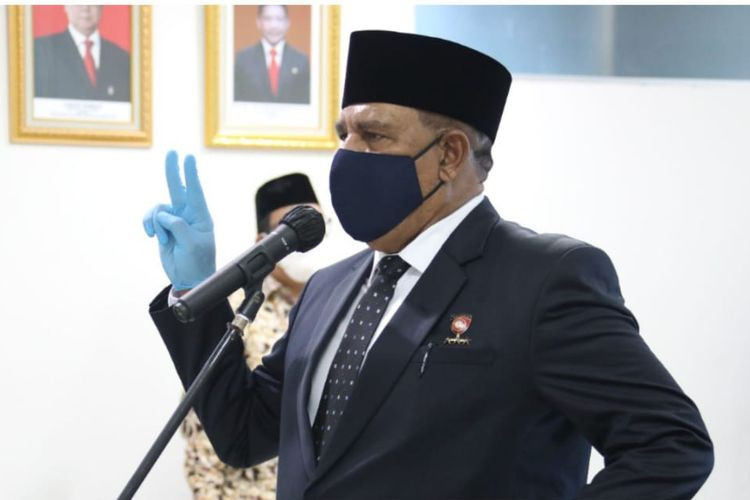Popular Reads
Top Results
Can't find what you're looking for?
View all search resultsPopular Reads
Top Results
Can't find what you're looking for?
View all search resultsAppointed, not elected -- yet powerful
Not only can the interim leaders serve for a few years without people’s mandate, they will also wield powers that barely differentiate them from elected ones.
Change text size
Gift Premium Articles
to Anyone
 Deputy to the home minister for border area resource management Paulus Waterpauw takes an oath as he is installed as the acting West Papua governor at the Home Ministry in North Jakarta on May 12. Home Minister Tito Karnavian also inaugurated four other acting governors on the same day. (National Police /Public Relations Division)
Deputy to the home minister for border area resource management Paulus Waterpauw takes an oath as he is installed as the acting West Papua governor at the Home Ministry in North Jakarta on May 12. Home Minister Tito Karnavian also inaugurated four other acting governors on the same day. (National Police /Public Relations Division)
H
ome Minister Tito Karnavian installed five acting governors on Thursday, marking the beginning of the mass replacement of 271 regional heads this year and next year as a consequence of electoral reforms that Indonesia will experiment with in 2024. The non-transparent process of filling the posts, needed to avoid vacuum of power in the regions, feels like a throwback to the New Order era, when the central government, not the people, determined who led where.
Transparency matters in the selection of acting regional heads as they can serve for quite a long time -- up to three years, unless there are no electoral disputes -- until the definite governors, mayors and regents to be elected in the simultaneous regional elections on Nov. 27, 2024 take office. Not only can the interim leaders serve for a few years without people’s mandate, they will also wield powers that barely differentiate them from elected ones.
According to a 2016 Home Ministry regulation, the acting leaders can draft regional budgets and reshuffle the bureaucracy, albeit with the home minister’s consent. In the past, such authorities eluded acting leaders, who normally served less than six months.
The acting governors inaugurated on Thursday were: director general of minerals and coal, Ridwan Djamaluddin, who will lead Bangka Belitung province; regional secretary, Al Muktabar, in Banten province; director general of regional autonomy, Akmal Malik, in West Sulawesi; expert staff to the sports and youth affairs minister for sportsmanship culture, Hamka Hendra Noer, in Gorontalo; and deputy to the home minister for border area resource management, Paulus Waterpauw, in West Papua.
Later this year, the government will also select an acting governor for Special Region of Aceh in July and Jakarta in October, while next year, 17 governors will leave office, including those in West Java, Central Java and East Java.
For some of the outgoing governors, the coming two years will be crucial as they may compete in the presidential election on Feb. 14, 2024. Jakarta Governor Anies Baswedan, Central Java Governor Ganjar Pranowo and West Java Governor Ridwan Kamil are potential candidates although no political parties have officially endorsed them.
The inauguration of five acting governors on Thursday obviously disregarded the Constitutional Court’s recent order for the government to issue a guideline that would make sure the selection process is open and complies with democratic principles. The lack of transparency will only give rise to speculations that the central government has a hidden agenda.
The Constitutional Court also ordered the government not to choose active military and police officers as acting regional heads. The prohibition is already in place in the 2004 Indonesian Military Law and the 2002 Police Law, but between 2008 and 2018 the government breached the rules several times. This time around the government has shown an intention to repeat the mistake, despite the fact that there are more than enough top-echelon civilian officials eligible for the acting regional head posts.
Without credible and clear rules of the game, the selection of acting regional heads will be prone to horse trading among the ruling elites, at the expense of Indonesia’s regional autonomy in particular and democracy in general.









